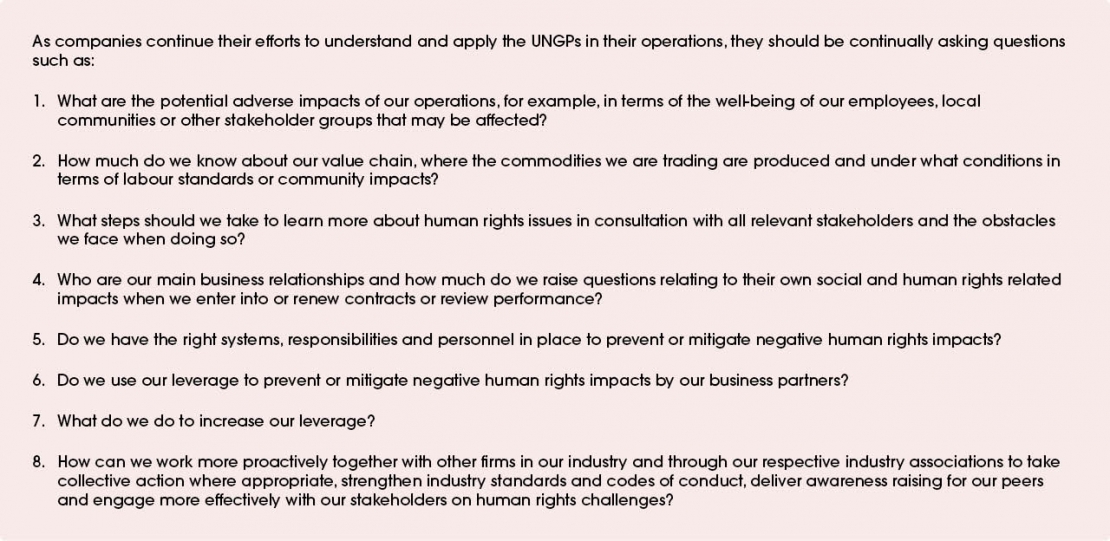Introduction
This website is intended to help representatives of commodity trading firms to implement the UN Guiding Principles on Business and Human Rights (UNGPs) in their company systems and cultures. It summarises what the UNGPs expect of all companies, regardless of their area of activity or size. It is based on The Commodity Trading Sector: Guidance on Implementing the UN Guiding Principles on Business and Human Rights (the Guidance). It contains all of the information contained in the Guidance and has been designed as a user-friendly tool for companies and other stakeholders to assist in easily navigating through the Guidance and the range of related resources and materials that can be of assistance.
Illustrative examples, current practices and recommendations for action are intended to help users understand the broad concepts presented and suggest possible steps that may assist in undertaking human rights due diligence, with particular focus on the characteristics of and challenges associated with commodity trading. Recognising that each company is different, the aim of this Guidance is to help trading companies in their own efforts to “translate” respect for human rights into existing systems and company cultures. There are additional resources (e.g. links to existing reports, toolkits etc.) that can support efforts in this area.
This website also provides a tool for the sector as a whole in developing a shared practice of responsible trading consistent with international standards relevant for the respect of human rights. It should also be useful to those who are interested in promoting respect for human rights in the commodity trading sector, including industry associations, civil society organisations and governments.
The guidance stages cover the key “human rights due diligence” steps expected of companies in the UNGPs. They range from setting out a commitment to respect human rights to identifying and addressing human rights risks, to providing remedy where actual harms occur. The UNGPs make clear that States’ obligations and companies’ responsibilities are independent of each other. However, where governments are unwilling or unable to meet their own human rights obligations, this potentially increases the risks of corporate involvement in adverse human rights impacts.
Ongoing Questions for Commodity Trading Companies
As companies continue their efforts to understand and apply the UNGPs in their operations, they should be continually asking questions such as:
- What are the potential adverse impacts of our operations, for example, in terms of the well-being of our employees, local communities or other stakeholder groups that may be affected?
- How much do we know about our value chain, where the commodities we are trading are produced and under what conditions in terms of labour standards or community impacts?
- What steps should we take to learn more about human rights issues in consultation with all relevant stakeholders and the obstacles we face when doing so?
- Who are our main business relationships and how much do we raise questions relating to their own social and human rights related impacts when we enter into or renew contracts or review performance?
- Do we have the right systems, responsibilities and personnel in place to prevent or mitigate negative human rights impacts?
- Do we use our leverage to prevent or mitigate negative human rights impacts by our business partners?
- What do we do to increase our leverage?
- How can we work more proactively together with other firms in our industry and through our respective industry associations to take collective action where appropriate, strengthen industry standards and codes of conduct, deliver awareness raising for our peers and engage more effectively with our stakeholders on human rights challenges?
Answering these and other questions and working to implement the UNGPs will assist in addressing the wide range of human rights risks which commodity trading companies face given the sector’s global reach and the complexity of their operations.
The UNGPs provide an authoritative framework through which companies can prevent and mitigate adverse impacts on the rights of people. The challenge now for the commodity trading sector is to work with all stakeholders to shape a shared practice of responsible trading which is consistent with international human rights standards.

This guidance does not propose a set management system but instead acknowledges that companies require flexibility when implementing the UNGPs in their own circumstances. The various sections of the guidance can also be referred to independently during the on-going process of implementation. The guidance is not intended to be legally binding and examples are provided for illustration (see UNGPs section).
Like in other sectors, some companies involved in commodity trading are likely to have a range of existing policies and processes that are relevant to respecting human rights, as well as an established corporate culture or set of values that guide company actions. These should all be considered as part of efforts to ensure implementation of the UNGPs.
The overall aim is to ensure that company policies and processes include human rights due diligence as set out in the UNGPs and focus on risks to individuals and communities (also referred to as “rights holders”*).
Finally, the guidance recognises that implementing respect for human rights across a company’s activities and business relationships* is a significant challenge. Embedding the UNGPs into company operations requires ongoing commitment, resources and engagement, including with external stakeholders. Implementation of the UNGPs is therefore a process of continuous improvement and this guidance reflects learning from existing practices, research and consultation with relevant stakeholders that will continue to evolve based on further experience.
*see definitions in right hand column.


